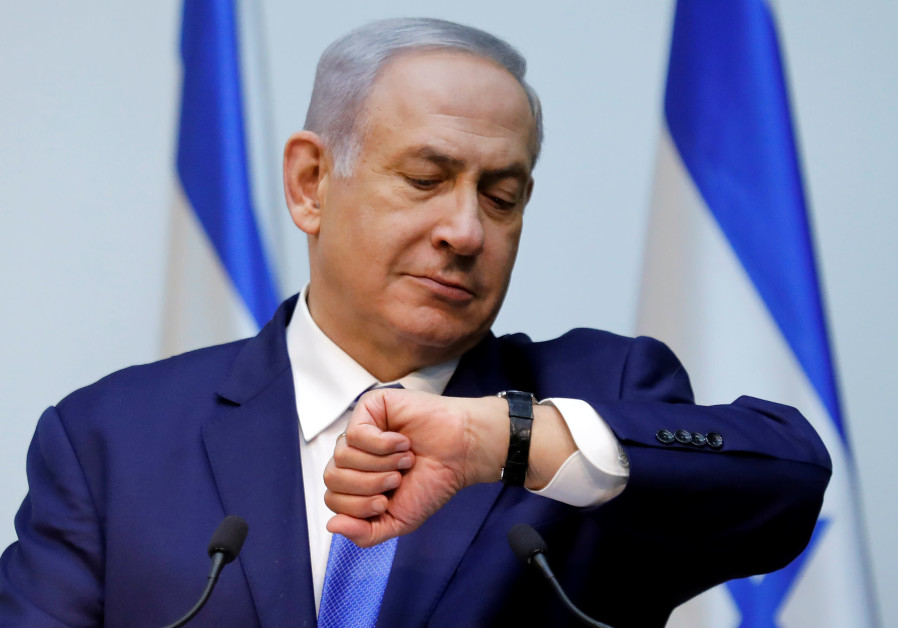PM: Election campaign would be worst time for US to release peace plan

Israeli Prime Minister Benjamin Netanyahu looks at his watch before delivering a statement at the Knesset, Israel’s parliament, in Jerusalem December 19, 2018. (photo credit: AMIR COHEN/REUTERS)
The United States is unlikely to roll-out its long awaited peace blueprint during the Israeli election campaign because it wants to maximize, not minimize, its chance of success, Prime Minister Benjamin Netanyahu said on Monday.
Asked at a press conference in Rio de Janeiro about the timing of the publication of the plan, Netanyahu said Washington is interested in giving that plan the greatest chance of success, “and in their estimation elections are the time when it will have the least chance of succeeding.”
The prime minister said that it would be preferable to have a public discussion about the plan after the elections, not during them, since the way in which different actors relate to the plan will “understandably” be of a different nature if released during the campaign.
There is some speculation now that the US might present the plan after the elections, while coalition negotiations are underway. In this case, the plan would then become a central consideration for parties needing to decide whether or not to join the future government.
Asked about Israel’s ties with Arab states in the region and when he will make another official visit to an Arab state as he did in October to Oman, Netanyahu said he would not say when he will meet publicly with the next Arab leader, “But it is not going to be very long.”
“I can tell you that I meet with many Arab leaders,” he said. “Muslim and Arab leaders. I meet a lot of them, all the time.”
Netanyahu said he did not know whether the Trump peace plan, when presented, would bring the Palestinians to the peace table. But, he added, “What I am trying to do is normalize relations with the Arab world so that the dog starts wagging the tail, and not the other way around.”
Jerusalem has long been frustrated that the Palestinians have a seeming veto over the normalization of ties between Israel and the Arab world, and would like to now see the Persian Gulf emirates – because they are interested in closer cooperation with Israel – nudging the Palestinians toward being more accommodating and compromising in their positions on the peace process.
Turning to the situation in the north, Netanyahu said that the operation to uncover and destroy Hezbollah attack tunnels has deprived the organization of a central component in a future surprise war against Israel.
“They invested in this as an opening campaign” in a future war, Netanyahu said, “and we destroyed it.”
Netanyahu said that Israel is not only concentrating on the tunnels. “From time to time you hear about an action here, an explosion there. Believe me, we are doing other things that I cannot detail.”
He said that the operation against the tunnels was “more or less” completed.
Netanyahu, on the fourth day of a five-day visit to Brazil, said he will meet US Secretary of State Mike Pompeo on the sidelines of the inauguration of Brazilian president-elect Jair Bolsonaro in Brasilia on Tuesday. He said he will also meet US National Security Adviser John Bolton in Jerusalem on Sunday. The focus of both those meetings is expected to be the US troop withdrawal from Syria.
Bolton will be in Israel as part of a regional tour that will also take him to Turkey.
According to a senior diplomatic official, Netanyahu asked US President Donald Trump in a recent phone call to ensure that the withdrawal of US troops from Syria will be done gradually and over an extended period of time.
The phone call came just a couple days before Trump’s surprise announcement last month that the US would withdraw its 2,000 troops from Syria. On Sunday, after meeting Trump at the White House, South Carolina Senator Lindsey Graham – who was a sharp critic of Trump’s decision – indicated that the withdrawal would be slower than the 30 days originally planned.
After the meeting, Graham tweeted that Trump will make sure any withdrawal from Syria will be done in a way to ensure that Islamic State is permanently destroyed, that Iran doesn’t “fill in” areas where the US evacuates, and that America’s Kurdish allies are protected.
Netanyahu, according to the official, is considering attending the World Economic Forum in Davos in January to meet there with Trump, who is likely to attend.
Join Jerusalem Post Premium Plus now for just $5 and upgrade your experience with an ads-free website and exclusive content. Click here>>






Comments are closed.